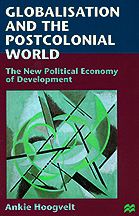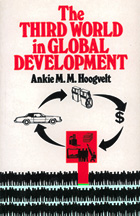


Ankie Hoogvelt's interest in development studies predates her arrival at Sheffield University to teach sociology. Her own undergraduate and graduate studies laid the groundwork for a political economy approach to both sociology and the field of economic development. When she was invited to teach a first-year course on the sociology of development, she transformed the topic into a challenging course of study that burst the boundaries of the traditional disciplines.
As her academic life work progressed, she took on the larger questions of development economics, the politics of development, colonialism, imperialism, and globalisation. She shaped a unique position in development studies, leading to organizing conferences and seminars on the field that helped to define the new development studies as both formal academic study and worldwide intellectual debate.
This interview provides us a chance to see and hear Ankie Hoogvelt take a look at the discipline, its prospects, and to review her part in it.
Ken Collier, Director of Athabasca University's Centre for Learning Accreditation, spoke with Ms Hoogvelt in England in March 1998.

![]() Ankie Hoogvelt discusses the restructuring of the
discipline of development studies.
Ankie Hoogvelt discusses the restructuring of the
discipline of development studies.
Aurora: In your first book, The Sociology of Developing Societies, you said you had been asked to teach this topic to first-year students and you responded, "Whatever for?" That same question could be asked today in the study of development as a discipline. Where do development studies fit in the great scheme of things?
Hoogvelt: It's interesting to be reminded of what I set out to do 25 years ago. At the time a lot of people in the advanced world were idealistic and interested in improving the world. Development was a towering belief, an ideology.
Years ago, people wanted to go as volunteer workers to do a stint in a developing country. Development studies seemed necessary in that context to understand what was going on and how people in more disadvantaged parts of the world could develop.
We all participated in this philosophy. As a teacher, it struck me as a normal thing to do. But we have moved a long way from there. Now there are many fewer students who share the ideal of wanting to do something to improve the lot of humankind on the other side of the globe. That has taken the heart out of development studies.

Intellectually, and in the theoretical context, things have happened—conceptually as well. Changes in the world economy have fragmented and dissipated development studies as a concept. It has fragmented into different types of studies. The unifying idea of a third world that needs to develop has disappeared, along with the enthusiasm in the West to do something about development.

Aurora: Your most recent book, Globalization and the Postcolonial World, reshapes some of the concepts that have been used in development studies for decades. What is the reshaping and what kind of impact does that have in the way it is studied? At one point we used the ideas of "centre" and "periphery"; almost like a geographic set of terms where the centre was one place and the periphery was somewhere else. But they seem to have relocated in the intervening years.
Hoogvelt: Yes. The starting point for this latest book is not that I restructured the debate. I am trying to introduce the students to the way the debate on development has been restructured and fragmented into different disciplines and concerns. The most important difference is that the third world or the periphery as a unitary category has disappeared. Some third world states have become developed, and, at least at the time of my writing, are set to take the baton of economic growth away from what used to be the old core countries; I'm referring to East Asia and the United States. Others have become completely marginalized: Africa can hardly be defined in the same periphery as Latin America.
These enormous variations in the experience and performance of what used to be one category "the third world" have given rise to a restructuring and reorganization of development studies. There is no such thing as "development studies" anymore.
Instead, on the one hand we see a concern with the way that capital accumulation in the world economy renders riches and poverty as a centre-periphery relationship, though not necessarily geographically determined. Secondly, we have a field of studies which might be defined as comparative political economy that has few development theorists, who study different models of who does what best, or what kinds of societies and cultures are more suited or better equipped to achieve economic growth.
A number of fields have emerged that are concerned with the environment and environmental political economy. This is what "postcolonial" refers to: a number of theorists who have, starting from a postmodern orientation and philosophy, begun to undermine a lot of the generalizing, underlying framework itself that used to guide us in discussing things like exploitation and underdevelopment. In this latest book I try to follow all these different streams that have emerged.
Aurora: Might Development Studies disappear altogether? All those structures that we have like the centres for development studies or the institutes attached to universities and the relation to the foreign affairs parts of governments? Will they all be dissolved into just economics in general? Or might development studies have a resurrection and come back as a real discipline?
Hoogvelt: If it comes back, it will come back in a different form, one that captures the idea that development isn't just something involving certain geographic areas of the third world. It has to do with emancipation or liberation and the pursuit of better organizations of human economic and social existence within the context of this particular stage of the world economy.
I doubt if centres of development studies will make this transition. Instead, I think we will see something similar to what we've seen here in Britain recently. People have been changing curricula titles: what were labeled development studies are now international studies, or international relations, or international political economy, or globalization studies. In that sense, the institutional basis of development studies is disappearing.

Aurora: Your ideas about globalization are different from the usual offhand observation that globalization is about reaching out and encompassing the whole globe and drawing everybody in. You imply that rather than reaching out and including everybody, globalization is more like deciding who to pick to be part of the central economy and who to exclude.
Hoogvelt: Yes, that's right. I have a very specific, sociological view of globalization as an intensification of human relations, across borders, but not necessarily one that reaches out and touches all parts of the globe.
Unfortunately, I think we ran out of words. Having defined internationalization and trans-nationalization, we came up with "globalization" which gives the erroneous impression that we're talking about an extension of capitalist relations to further and more remote parts of the globe. That is not what I or the majority of people who write about globalization mean.
Globalization is the intensification of human interaction at all levels—financial, social, and cultural. This is taking place in a period I call "capitalist implosion." If you measure empirically the way we used to measure things like cross-border trade as a percentage of world product, or the number of countries involved in international trade and what they contribute as a percentage to international trade, you will find that a lot fewer countries, particularly in Africa, are participating in those kind of global economic relations.
At the same time, the global economic relations, in which other
countries (such as Canada) are participating, are intensifying. There is a
strange dualism going on. Castells comes up with the best definition of
globalization: "a process in which there is an economy in real time on a
planetary basis," but that does not necessarily involve everybody. 
Aurora: Some people whom we used to think of as part of the periphery—in some other part of the world;—are now among us. They are our neighbours and friends. Some of them in our cities and our workplaces take part in the spoils and some don't. That certainly wasn't part of the concept of development studies 20 or 30 years ago.
Hoogvelt: Yes, that's right. I make the point in my book that
each period of capitalist development in history has certain material
bases and features, but also an ideological reflection.

Despite the controversies between the Marxist and Liberal views of capitalism through the last century, they had one common over-arching view that capitalism was an ongoing, expansionary process that would bring more people on board whether through exploitation or liberation or a kind of upgrading. That view never recognized that capitalism could shrink.
But capitalism is shrinking; it is intensifying and shrinking and expelling more and more people who are—again in Manuel Castells' words—structurally irrelevant to the system. Those people who are irrelevant to either production or trade or as consumers, live, of course, in Africa, South Asia, and Latin America. They also live amongst us, here.
Recently, I have begun to concentrate my research on local issues of development because we have the structurally irrelevant fourth world in our midst in the inner cities of advanced countries, but not, of course, in as great numbers as they have in Asia. This is a completely different view of development and under-development than the one that was current until the mid '80s.
Aurora: Yes, we used to have to go to another continent to take part in development.
Aurora: The last chapter in your book talks about how the process of excluding certain regions and communities from globalization opens the terrain for activities involving individuals acting on a small scale, who weren't considered part of the economy before or weren't relevant to think about.
Hoogvelt: Yes. I was struck by the fact that recent Latin American development writers who have been at the receiving end of globalization and marginalization or structural irrelevance have come up with what seem like excuses for the situation. They seem to be saying, "Oh well, we can make the best of the situation because capitalism is leaving us free to do whatever we like and to become imaginative and create whole new forms of human social existence."
I don't know if you can be hopeful about that. There is some sense in saying that if you are not involved in the capitalist system - because capitalism is withdrawn from you completely and isn't interested in you either as consumer, or worker, or even as cannon fodder these days - that at least frees up your imagination to think about different forms of local collective living. But the successful examples of this are very few. It's clutching at straws, but one does have to try.
Aurora: True, and many of the examples that would illustrate it never make their way into books or newspapers or as the subject of a movie. There may be a multitude of them going on and forming a part of the informal or domestic economy, because those people continue to live despite all odds. But we never hear about it.

Hoogvelt: Yes, and there is a trend, although it's not "macho" enough to be studied in great depth, of more and more people opting out of the system. There is a down-shifting where people want to jump away from the rat race and search for alternative forms of living and co-living with others in small communities. But you are right: particularly if they are successful stories, they should be communicated.
Aurora: Another element from that last chapter in Globalization and the Postcolonial Worldis that this isn't only about poor people doing inspiring local or informal economic acts. It's also about the many people who appear to be beneficiaries of globalization, those living in the core, becoming aware of their contradictory place in the global community.
Hoogvelt: Yes, that's true. I recognize that this is the dilemma of globalization as well as of the postmodern way of living. Fragmentation has come about as a result of extreme commodification, hand-in-hand with the latest phase of capitalism, and this means that individuals in themselves are fragmented. If you do want to make a sacrifice, or assist people, or donate money, you'll find you are coming up against yourself and the way you are being involved in the capitalist system. It's very difficult to disassociate yourself from it.
Take the example of pension funds. Now that I'm going to retire, I am desperately dependent on my pension fund doing all the nasty things that I don't want it to do. This has become much more acute and gone beyond the traditional role conflict that earlier sociologists highlighted. This is a real dilemma; it is not easy.
Aurora: It represents within our own personal lives the very dilemma that other people don't have many choices about. I used to assume that by taking part in government-run schemes that I would not have to concern myself with the gathering up of money for my pension or any evils that would go along with it because the government would somehow be doing this in a benign way.
Since then, the government has more or less withdrawn from the field and said, "Go it alone. You have to plan your own pension; we are not going to take care of you anymore." You are confronted with the same questions you thought only other people would have to deal with. You mentioned that you are going to retire soon, but I gather that this is not a complete retirement.
Hoogvelt: I am going to be doing several things. I want to develop more distance learning modules. Some of it is available through the Internet—my globalization lectures which are the multi-media, hypertext presentation of the second part of my book. I want to do more about that.
The other thing I am involved in is local research —very, very local for somebody who has written about globalization such a lot —with inner-city regeneration in neighborhoods very near the University of Sheffield. I find that fascinating.
I'm also doing some work on what is called the "New Deal" in England —the new deal for youngsters I'm doing some research with a cohort of youngsters who are being taken through the welfare-to-work program.
You may be interested in reading some of Ankie Hoogvelt's other books, available from the following publishers:
Hoogvelt, Ankie M.M. The Sociology of Developing Societies.2nd Edition. London: Macmillan Press, 1978.
Ankie Hoogvelt, The Third World in Global Development. London: Macmillan Press, 1982.
Ankie Hoogvelt, Globalization and the Postcolonial World. Johns Hopkins University Press , 1997.
--- editor, et. al. The New Political Economy Journal. Sheffield: University of Sheffield, 1996.
Email ahoogvelt@sheffield.ac.uk
Aurora Online
Citation Format
Ken Collier (1998) An Interview with Ankie Hoogvelt, Aurora Online